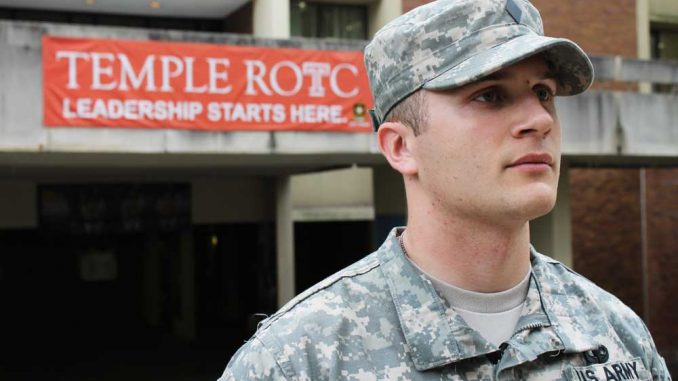
Alex Cardinal has a dignified silence about him. Dressed head to toe in camouflage, he refuses to come outside the building without his Army-regulation hat, which is required on dress days like today by ROTC rules.
Cardinal is one of 17 seniors currently enrolled in the ROTC program, headed toward service in the U.S. Army after graduation in May. It’s a college experience that not many non-ROTC students can imagine, with days full of workouts, classes and structured schedules. But Cardinal, who said he knew he wanted to go in to the military since age 13, wouldn’t have it any other way.
A four-year veteran of Temple’s program and a senior history major, Cardinal’s life has differed from the normal college experience since he first set foot on Main Campus. But as his fellow Temple seniors prepare to enter an economically-scarred civilian job market, he has seen his life diverge sharply from the traditional stresses and anxiety of senior year.
“It all starts with junior year summer, that’s the biggest difference,” Cardinal said.
That’s when he and his fellow ROTC cadets head to Fort Lewis, Wash., for their leadership development assessment course, or LDAC, where they are evaluated and ranked on a nationwide cadet listing. Completion of the course is mandatory for graduation from ROTC, Cardinal said, and the rankings list can have major implications for post-graduation prospects.
“Once you go to this course, you get ranked throughout the country, and then you’re on this list,” Cardinal said. “[It’s] an order of merit list, from No. 1 cadet to the last cadet.”
For cadets interested in the coveted active duty slots, like Cardinal, these rankings are serious. With only a limited number of active duty slots to go around, he said, the full-time, active duty assignments go to those who are first on the list.
Cardinal, a recipient of the ROTC national scholarship, received his desired active-duty assignment.
But the process is far from over.
After cadets are assigned to active duty, National Guard or Army Reserves, there are several more suspense dates, Cardinal said. Next up is branching, where cadets are told their specific assignments. Each cadet submits a list of his or her top branch choices and, based on their LDAC listing, the Army tries to assign them to his or her top choice. But, Cardinal said, sometimes it doesn’t pan out.
“If it comes down to it and you didn’t do as well [at LDAC]…it’s called knees to the Army,” he said, with the hint of a smile. “They put you wherever they want.”
Cardinal, however, knows where he’s going. He’ll graduate from Temple and immediately head out to Washington state, where he’ll be an evaluator at the LDAC course. After that, he’ll be heading to Fort Benning, Ga., where he’ll take his basic officer leadership course in infantry.
It’s this structure, he said, that’s unique to the ROTC post-graduate experience.
“I feel like a lot of people coming out of school, graduating, they don’t have a plan and a course of action, [or] know what they’re planning on doing,” he said. “I know exactly where I’m going to be working. I know where I’m going and what I’m going to be doing and what the standards are for that. I know exactly what’s going to be expected of me.”
But it comes with a price.
“It’s a lot more responsibility,” said Cardinal, who will graduate as a commissioned second lieutenant. “The most prevalent job [second lieutenants] get is platoon leader. So you’re essentially in charge of 40 to 50 people. Those lives are in your hands.”
It’s a tall order, but one that Lt. Col. James Castelli, a military science professor and adviser in the ROTC program, said his ROTC cadets are ready for.
Castelli said the program plans to commission 12 or 13 new officers in May, of the 17 seniors. Those who remain are simply behind in credits, like any other college student. Once they complete the requirements, they too will take their first post-college steps into the Army.
“I think that there’s no better preparation for graduating, and everything that comes after, than the military training, the lifestyle that they’ve learned to live,” Castelli said. “We can’t train Army officers for everything that they’re going to need to know when they get out in the regular Army. But what we can do is train them to be leaders and decision makers.”
Cardinal said he feels more than prepared moving forward. It may have been a non-traditional college experience, but life in ROTC was invaluable. He doesn’t know if he’ll make a career out of the military. After fulfilling his required service, he could see himself teaching. But whether he winds up in the military or working a civilian job, Cardinal knows that his ROTC experience has prepared him.
“I wouldn’t trade my college experience for anything else,” he said. “I feel like, if I came and didn’t do ROTC, I would’ve had tendencies not to do my work on time. It just made me a better person, and more ready to grow up.”
Ali Watkins can be reached at ali.watloms@temple.edu or on Twitter @AliMarieWatkins.



Be the first to comment